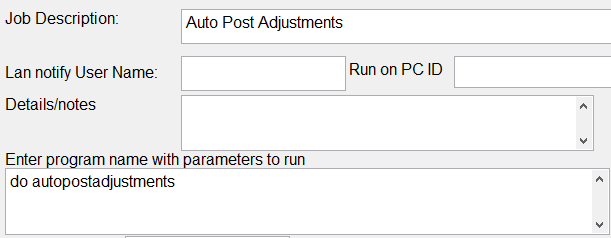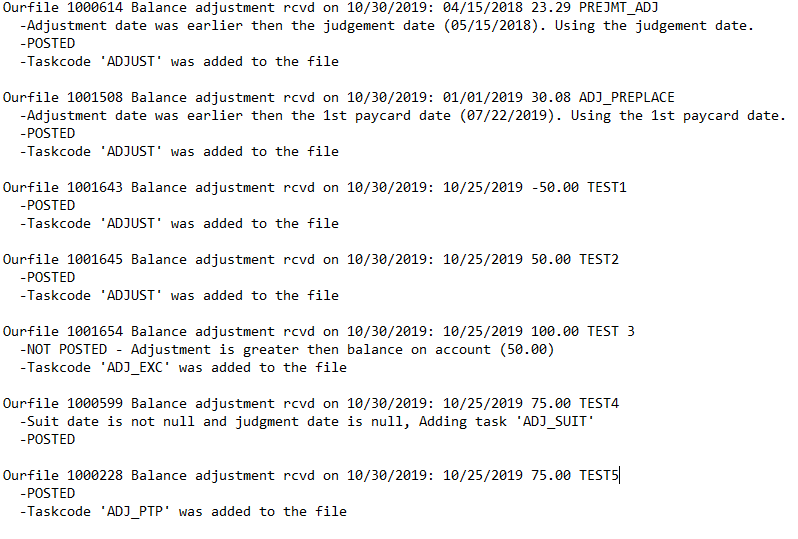Q-Law
Auto-Posting Adjustments
Summary
Q-Law will now process a CSV file and import adjustment records to the paycard on matched accounts. Adjustments can be posted to Principal, Interest, Costs, or Attorney Fees. All adjustments will post as trx 0 (Trans.trx = ‘0’).
Setup
Import Folders
The \Qlaw\payment\auto_adjust and \Qlaw\payment\auto_adjust\done folders MUST exist on the system.
Import File
In order for adjustments to post, the import file must be saved in the \Qlaw\payment\auto_adjust folder and meet the following criteria.
Filename: adjustments-CCYYMMDDHHMMSS.csv
Filetype: CSV
Layout:
| HEADER | DESCRIPTION |
| custfile | matches to debt.ncustfile |
| forw_file | matches to debt.custfile |
| dp_date | date of adjustment (paycard.date) |
| dp_cash | Adjustment amount (paycard.amount) – If negative amount, it will increase the balance on the account – If positive amount, it will decrease the balance |
| payadj | Adjustment type (paycard.payadj) N – principal R – interest C – cost F – attorney fees |
| dp_cmt | Comment (paycard.comment) Limit 40 Characters |
| Dprefno | Comment (paycard.comment) |
Example File:

Firm Preferences
Maintenance > System maintenance – Admin tab > [Firm Preferences] > Misc preferences tab
Five firm preferences are tied to adjustments. By default, all firm preferences are set inactive and values blank.
- BALADJINC: When inactive, negative adjustments (dp_cash < 0) will be ignored and adjustments that increase the balance are not posted. Activate firm preference to post adjustments to increase account balance.
- BALADJEXC: When active, when there is an exception as to why the adjustment can’t be posted (e.g., the adjustment is greater than the balance on the account), the task code set in the value column will be added to the account. If inactive, the adjustment will not post; no task is added.
- BALADJSUIT: When active, if there is a suit date (dlegal.suitdate) but no judgment (dlegal.judgdate is null) when the adjustment is posted, the task code set in the value column will be added to the account. If inactive, the adjustment will post; no task is added.
- BALADJTASK: When active, the task code set in the value column will be added to the account when any adjustment is posted (if no other task codes have been added via firm preferences). If inactive, the adjustment will post; no task is added.
- BALADJPTP: When active, if an active PTP is on the account, the task code set in the value column will be added to the account when any adjustment is posted. If inactive, the adjustment will post; no task is added.

DDAS
Maintenance > Edit/Add/Delete/Functions tab > [Setup DDAS]
There are two supported DDAS for importing adjustments.
SYSTEM POSTADJUST: When active, this DDAS will trigger any time an adjustment posts to an account.
SYSTEM REVADJUST: When active, this DDAS will trigger any time an adjustment cannot post to an account due to an exception.
Posting Rules
Q-Law automatically enforces the following rules during the adjustment auto-posting process. These rules cannot be changed or ignored. Exceptions must be handled manually.
Adjusting account balance below zero: If an adjustment would make an account balance go below 0.00, the adjustment will not post.
Judgment on the account and the date of the adjustment is prior to the judgment date: If there is a judgment on the account (J line in the paycard) and the adjustment date is prior to the date of the J line, the adjustment is automatically set equal to the judgment date/paycard J line date.
Adjustment date is prior to the first line in the paycard: If the adjustment date is prior to the first line in the paycard, then the adjustment date will automatically be set to match the date of the first line in the paycard.
Posting Adjustments
Adjustments can be posted by setting up a Job Scheduler job to process the import files.
Job Scheduler
Maintenance > System maintenance – Admin>Misc > [Auto Job Scheduler]
Program to Run: do autopostadjustments

Log File
Every time the adjustment auto-post program is run, a log file named: Balance_Adjustment_CCYYMMDDHHMMSS.txt is created in the \Qlaw\Logs folder. This log file provides a summary of the auto-posting processes and will indicate:
- Any rules preventing adjustments from adjustment posting or from being applied during the posting process.
- Firm preferences\tasks applied during the posting process.
Example Log File:

